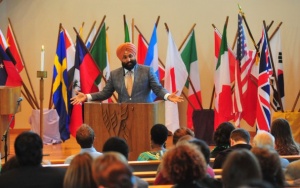Rahuldeep Singh Gill
Rahuldeep Singh Gill
Rahuldeep Singh Gill tends to stand out at California Lutheran University, where he is the only religion professor who is not Christian. Gill is a Sikh, a popular religion in the Punjab state of India, where he was born. And he wears a dastar, or turban, setting him apart both on campus and in the community. On campus, Gill uses those differences to encourage others to examine their biases, his own open mind serving as an example, said Rudy Lugo-Rios, 20, a junior majoring in psychology. “He takes that first impression and works with it,” Lugo-Rios said. “He turns it into a lesson about how we think — that we need to look at our own assumptions, that we need to look beneath the surface.” Gill also allows students and colleagues to understand another religion through the eyes of a believer — a valuable asset, said R. Guy Erwin, a CLU professor of religion and history. “He’s a visible witness to us of the diversity of the world,” Erwin said. Gill is in his second year at the Thousand Oaks university, where he teaches several survey courses, including Introduction to Christianity and Introduction to the Study of Global Religions. He’s also taught courses that reflect his own interests. Last semester he taught Songs of Indian Saints, where students read Hindu, Muslim and Sikh poetry from the Medieval period. This semester, he’s teaching The Sikh Tradition: A Case Study in Global Religions. “I love the American university,” he said. “I believe it’s the freest place on Earth.” Gill grew up in the suburbs of Massachusetts, where there was a small pocket of South Asians but where “people were still in the process of becoming accepting,” he said. He found college to be a liberation from some of the stereotypes he endured as a child. He had considered studying medicine but found himself drawn to religion because he wanted to understand people better. “If we want to have a stronger America, we need to talk about our assumptions,” Gill said. “Our religious and cultural heritages inform those assumptions, and that’s why I studied religion.” Now he wants his students to understand the perspectives they bring to religion, politics and other issues. And he reciprocates, working hard to know them and understand the backgrounds they bring to class, students and colleagues said. “If there’s anybody who’s a model of inclusivity, he’s it,” said Sig Schwarz, a CLU English professor. “He’s so embracing of other people, whatever surprise one might feel on seeing him dissolves.” In the classroom, Gill expects students to be responsible for their own learning. That means he expects them to not only read the text so they understand what it’s about, but also to understand why it matters. Beyond that, he wants his students to be able to write clearly — an extension of thinking clearly, he said. “It’s more of a seminar,” said Maura Schmitz, 23, a senior majoring in theology. “He’s going to feed you some of it, but he also expects you to ask questions and come up with answers as a group. You know going into the class that you’re going to be challenged.”

